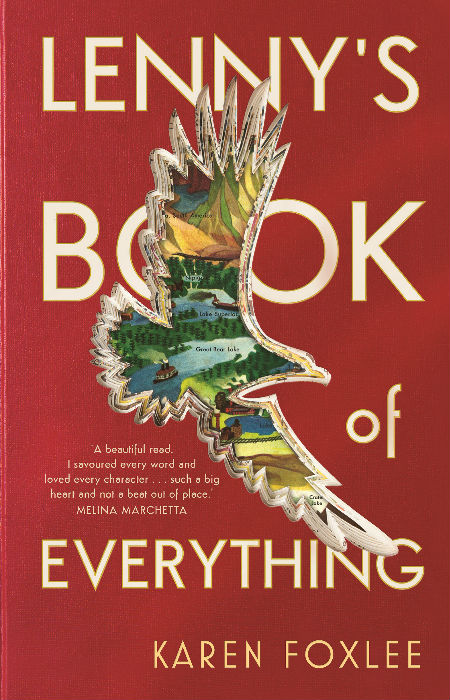
There is this overly-romantic idea out there that the moment someone close to you is in some kind of mortal danger that you somehow ascend to a hitherto unglimpsed level of sainthood.
It is as if how much you love that person is an inert mass of little to no consequence until something catalyses it into something more miraculous, beautiful and transformative in a way that would make angels envious.
As Lenore Spink, the Lenny of Lenny’s Book of Everything, wisely observes that’s simply not the case, especially if you’re still a child who’s grappling with her place in the world when things are okay, let alone when things slide into places you simply aren’t yet equipped to handle.
Or more precisely, will never be equipped to handle because who of us ever handles situations of threatened mortality with the grace and elegance we would like to?
Sure, we have these idealistic images in our head of the way things are supposed to be, and we desperately try to measure up to them, but we invariably fail, which is Karen Foxlee’s sublimely-beautiful novel is such a balm for the soul, especially for those of us who have experience grief, loss and the darker side of being alive.
“Sometimes I’d say, ‘Don’t worry about it.’ Other times nothing because I’d be angry at having to clean up pee. You don’t become someone perfect just because your brother is dying. You stay the person you are and all your good and bad bits are magnified.” (P. 300)
Written with compassion and understanding, and a tone that elevates love and family without once being twee or mawkish, Lenny’s Book of Everything affirms again and again that we are not going to transform into perfectly angelic beings the moment adversity strikes us.
It is comfortable with the flaws and foibles that bedevil us all, and in fact, the story of Lenny, her younger brother Davey, who can’t stop growing because of a rare condition affecting his pituitary gland and their single mother Cynthia, abandoned by a restless father whose name is invoked like a comforting yet troubling chant by his daughter, is what happens when adversity comes on the scene that is of type and permanence no amount of finagling can overcome.
Cynthia is used to scraping to make ends meet; it isn’t easy and the stress on her throughout the book is well near palpable, but a few clever meal fixes here and some tap dancing around bill paying there, and the illusion that order is being maintained is reasonably easy to finesse.
Davey’s condition, which starts out as quirky and unusual and soon becomes far more than that, isn’t easily tamed, or tamed at all really, and while the weight falls on Cynthia as a mother, it also falls, in some ways even more heavily, on Lenny who is acutely aware, though articulation sometimes confounds her, of what she has lost in her father’s nomadic disappearance and the subsequent loss of contact with that side of the family.

For all the elements of loss and grief that percolate through this deeply-emotive and gorgeously-nuanced story, the language of which rolls off the page with a delightful cadence, even in the bleakest parts of the narrative, Foxlee goes to an inordinate amount of trouble, though it looks effortless, to build up Lenny’s world, both without and within her family, who live in a small town in Ohio in the mid-to-late 1970s.
The bonds between Lenny, David and their mum are strong and loving but not immaculately perfect, which is just like any normal caring family, and every Friday they look forward to more arrivals from Burrell’s Build-It-at-Home Encyclopedia, the result of a competition Cynthia won and which feeds not simply the quest for knowledge of both children but their need to escape and go somewhere far away from where they are.
As they journey from A through to Z, with all the possible subjects that could be covered in each of the issues inserted into the prose like the sweetest and most possibility-laden of punctuation marks, you see the children fill their dreams with what might be possible but also grapple with the dawning realisation that hopes and dreams (like going to live in Canada in a log cabin at Great Bear Lake; thank you volume “C” and innumerable others) are one thing, realising them, entirely another.
Still, there is something wonderful, despite the portentousness of Davey’s condition and Lenny’s emotional toing-and-froing as she tries to be the best person she can but fails (and honestly she’s a kid; she shouldn’t be having to struggle with these kinds of existential dilemmas) that is utterly charming and beguiling.
“I wanted a future. I wanted Davey’s future. I wanted Davey. I wanted Davey to see quicksand, to fall into it so I could rescue him. So I could drag him out with a big stick and Timothy could fly down from a tree with delight and we would walk home through the woods and he could wash in the lake and Mother would be in the cabin preparing our tea.” (P. 313)
Lenny is feisty, garrulous and very human in her fallibility while Davey is endlessly upbeat and optimistic, a bright, enthusiastic and caring boy whose smile and all-around lovely demeanour wins over just about everyone with whom he comes into contact.
He is a good kid, in fact, both of them are but Davey has that extra special something people love, which makes, of course, what happens to him all the more sadder; even so, Lenny is our window into their small, mostly perfectly-formed world, which also includes elderly neighbour and babysitter Mrs Gaspar, and it’s self-awareness and honesty that give the book such an aching sense of humanity.
Lenny’s Book of Everything may have a black “heart feeling” at its core – it’s the term used from the start of the book to describe a sense that all is not well, in an unnerving ill-defined kind of way – but it is also a sensitively-written, heartfelt love letter to the enduring, all-encompassing power of love, caring and friendship, and how all of these vitally-important things come to mean so much more when they are threatened by events beyond our control and when we, even as children, are confronted by the fact that life isn’t always as magically wonderful as it appears in hopes and dreams.